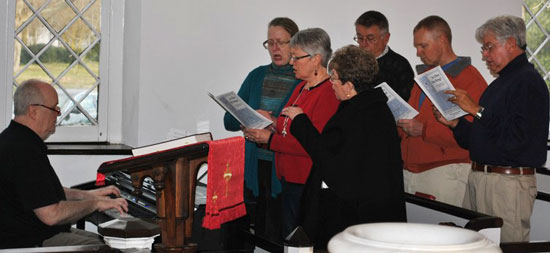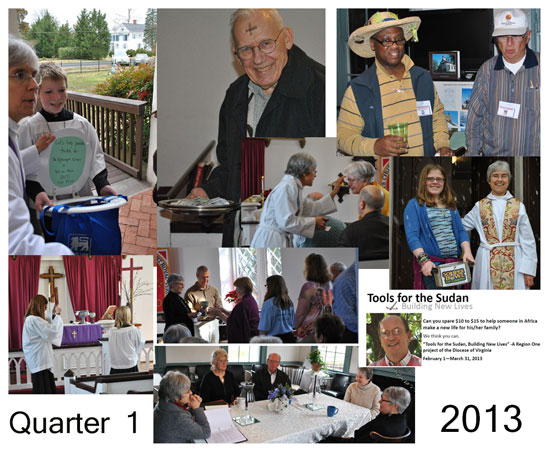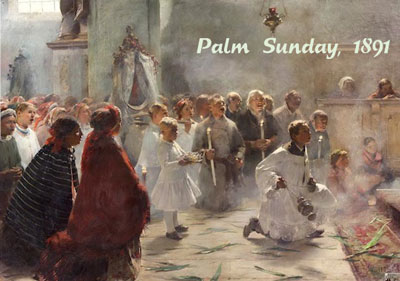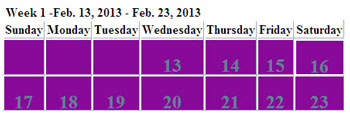
|

Reading the Bible in a year!
Resources


Block Print by Mike Newman

Continuing Projects
1. ECW Spring Meeting, May 23, 2013

Full information is here. This year’s meeting is at St. Mary’s White Chapel, Lancaster
2. Writing to Alex Long in Afghanistan

Alex Long would appreciate mail from you. You can write Alex a letter at this address:
Sgt Long, Alexander
1st MSOB A CO
UNIT 42550
FPO AP 96427-2550

Don’t see your pet ? Upload a picture

4. Prayer requests – Add a name to the prayer list here.
Easter 4 , April 21 / Earthday April 22, 2013 (full size gallery)
![]()
"The fifty-day season of Easter invites us to begin again, always. This season of the church year calendar challenges us to believe again or maybe for the first time that the God who mysteriously created us [through humans] has the capacity to make things new. It dares us to have faith that the God who mysteriously raised Jesus Christ from the dead is a God of miracles, big and small; that our waking up each day in and of itself is a miracle. " – The Reverend Ollie V. Rencher.

Christ centered, Biblically based, spirit filled and a place of simple hospitality, we have shared our communal life with our church,our community, and those in need. Your presence enriches us.
April 28 -9:45am- Adult Education on Climate Change – "Six Degrees Could Change the World."
April 28 -9:00am- Holy Eucharist, Rite I
April 28 -11:00am- Morning Prayer
Calendar
Tools for the Sudan, update
This report was sent via Larry Duffee in the Sudan on April 19,2013 and reflects only the $500 sent late in 2012 from Region One. The other funds are being sent shortly from the Dicoese of Virginia.

More focus on South Sudan – Hope for Humanity fundraiser 
Hope For Humanity from Richmond was formed to provide educational opportunities to the youth of South Sudan. Only 20% of South Sudanese can read: the second highest illiteracy rate in the world.
In 2007, Hope for Humanity completed the construction of a secondary school in the village of Atiaba, South Sudan: only the 22nd high school to serve the over 1.5 million children. A mere 7% of South Sudanese teachers have had any formal teacher training.
Read more about how you can help this school at "Building Futures", a fundraiser April 28th, Christ Church in Glen Allen, VA 2pm-4:30pm. The Fishers are going and would like to see your there.
Sig’s Diary, Part 3


Sigismund Stribling Ware ("Sig") was priest at St. Peter’s for 30 years (1888-1918). Recently a diary he wrote has come to light. This is part 3 of the series.
This is not an easy diary to decipher. Ware’s 1893 diary was a diary with 4 days on two pages, so he abbreviated and wrote small with names that cannot be deciphered. There is only a limited amount of text for a given day. We don’t know who he is writing for. Maybe only for himself and so it is more of a journal recounting his days. You can read the diary here.
It’s only 120 years ago the Rev. Ware wrote the diary in 1893 but what a difference from our time. This is a different world, one between the Civil War mindset and the horror of WWI but before some of those modern conveniences have been invented.
Take out modern forms of transportation (automobile), modern media (TV, radio), modern forms of communication (internet) and other conveniences, electricity among many things. It certainly must have been more quiet time, more in harmony with nature and with intimate personal contacts, probably fewer in number.
It is a more formal time with Ware addressing people as “Mr” or “Mrs”, not Dick or Jane. Rev. Ware was a man of habits. He takes his “usual walk” (though never describes what this is), takes tea in the afternoon and is very observant of nature. One place he often visited was walking with his daughter Cornelia to Catlett Hill just beyond today the intersection of Route 17/301. He thrives on human contact, visiting parishioners and non-parishioners.
What motivated him ? Certainly his work as a minister of God but beyond that gardening, reading (particularly biography) and letter writing. He was reading the “Life of Wordsworth”, and the “Life of Dr. Pendleton” earlier in the year. (The latter was a Baptist minister born in Spotsylvania, leaving the south in the Civil War over the issue of slavery). He read newspapers and kept up with events, noting on Jan 24, the death of famous Minister Phillips Brooks and writing in May 1 about the opening of the Chicago World’s Fair.
1893 seemed like a happy time for him – before he lost two of three children and his wife. He could only have managed this through the support of friends and parishioners. He has his 43rd birthday in 1893 and celebrated at the end of the year his 5th anniversary at St. Peter’s. He lived in the current rectory. He talked about mending the fence in front of the house.
Ware is both minister to Grace Church in Corbin and St. Peter’s in Port Royal, alternating between them on Sunday. For “Grace Sundays” he usually started to Grace on Sat. at 2pm to 3pm for a several hour drive in his horse and buggy. He usually stayed at Santee (dining with Mr. Dickinson, Mr. Gordon) or at Nottingham, one or two nights. In this time, both morning and evening services were held. Easter was on April 2 and during Lent they had additional services on Tuesday and Thursday. In any case, he didn’t venture far – usually between Corbin and Port Royal.
Part 3 – The Effects of climate change, the Forests

(This is the third in a series of articles on the environment and specifically climate change reflecting on the movie "Six Degrees of change " . We will have discussion on it April 28th at 9:45am in the Parish House).
Last week we tended to look down on earth from high dealing with rising temperatures, the effect on glaciers and water scarcity. This week we look at ground level to consider deforestation and next week the effect on the seas.
Deforestation

Forests play a vital role in maintaining the balance of the Earth’s ecosystems. They provide habitat for more than half of all terrestrial species, help filter pollutants out of the air and water, and prevent soil erosion. Rainforests also provide essential hydrological (water-related) services. For example, they tend to result in higher dry season streamflow and river levels, since forests slow down the rate of water or rain run-off, and help it enter into the aquifer.
Without a tree cover, the water tends to run off quickly into the streams and rivers, often taking a lot of topsoil with it. Forests also help the regional climate as they cycle water to the interior of a continent. The shrinking of the Amazon Rainforest (shown above) reduces regional rainfall, which in turn threatens the health of the remaining forest and of the agricultural land in Southern Brazil. This also results in an increased fire risk.
Forests and their soils also play a critical role in the global carbon cycle. The level of CO2 in the atmosphere depends on the distribution or exchange of carbon between different “carbon pools” as part of the carbon cycle. Forests and their soils are major carbon pools, as are oceans, agricultural soils, other vegetation, and wood products: the carbon stored in the woody part of trees and shrubs (known as “biomass”) and soils is about 50% more than that stored in the atmosphere.
Trees continuously exchange CO2 with the atmosphere. The release of CO2 into the air is due both to natural processes (respiration of trees at night and the decomposition of organic matter) and human processes (removal or destruction of trees). Similarly, CO2 is removed from the atmosphere by the action of photosynthesis, which results in carbon being integrated into the organic molecules used by plants, including the woody biomass of trees. Thus forests play a major role in regulating global temperatures by absorbing heat-trapping carbon dioxide from the atmosphere, and storing it in the form of wood and vegetation – a process referred to as “carbon sequestration”.
Unfortunately, the global benefits provided by trees are being threatened by deforestation and forest degradation. ‘Deforestation’ as a shorthand for tree loss. Forest ‘degradation’ happens when the forest gets degraded, for example due to unsustainable logging practices which remove the most valuable species, or artesanal charcoal production in which only a few trees are harvested. The Earth loses more than 18 million acres of forestland every year—an area larger than Ireland—according to the United Nations Environment Programme (UNEP).
Deforestation is a major cause of global warming. When trees are burned, their stored carbon is released back into the atmosphere. As a result, tropical deforestation (including forest degradation) is responsible for about 12-15 percent of total annual global warming emissions according to estimates released for the climate change meeting in Copenhagen.
2nd Annual "Shred It" Event St. Peter’s, May 10, 4pm-5pm

Thanks to Andrea Pogue for bring the paper recycling truck to St. Peter’s for a second year.
• Use this opportunity to securely dispose of those out dated, sensitive documents and financial records that you have accumulated over the years; and
• Use this occasion to clear out old file cabinets, boxes, folders and envelopes containing pay stubs, tax records, bank statements and receipts that have amassed over time.
Bring them to St. Peter’s on May 10 between 4pm and 5pm and watch the action. Suggested donation $5 per bag.
This is a fund raiser for community enrichment and charitable outreach efforts Last year we made $17 for the Mission Trip last year and we hope to do better.
We have encountered the idea of recycling several times in the last year. Last January, we heard from Salem Baptist in their drive for paper to support several local mission efforts. Hugh has been collecting paper. This month we are learning about the results of climate which should be a wakeup call for everyone.
Whether for the environment, to help St. Peter’s or to rid your home of excess papers, come down and bring your stuff on May 10.















 This is a project of the children of the church.Take one of the colorful collection cans from back of church and fill them up with box tops from participating products. By the end of February, bring them back to the church and give them to Tierra.
This is a project of the children of the church.Take one of the colorful collection cans from back of church and fill them up with box tops from participating products. By the end of February, bring them back to the church and give them to Tierra.












 Have you signed up ? Registrations closed March 7 for the March 21, 2013 retreat. (Haven’t registered ? Contact ECW Rep
Have you signed up ? Registrations closed March 7 for the March 21, 2013 retreat. (Haven’t registered ? Contact ECW Rep 







 Lent is a 40 day Christian festival beginning Ash Wednesday and concluding on Easter (Sundays are not counted). The word "Lent" comes from the old Anglo-Saxon word lengten, which means "springtime," named so for the time of the year in which it occurs. The purpose of this extended fast was to practice self-denial and humility. This was to prepare oneself for receiving God’s grace and forgiveness in baptism, given on Easter Saturday or Easter Sunday.
Lent is a 40 day Christian festival beginning Ash Wednesday and concluding on Easter (Sundays are not counted). The word "Lent" comes from the old Anglo-Saxon word lengten, which means "springtime," named so for the time of the year in which it occurs. The purpose of this extended fast was to practice self-denial and humility. This was to prepare oneself for receiving God’s grace and forgiveness in baptism, given on Easter Saturday or Easter Sunday.










